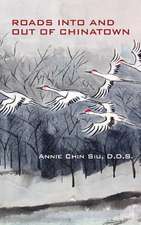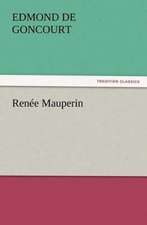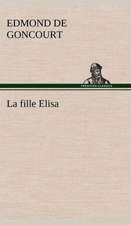Pages from the Goncourt Journal: New York Review Books Classics
Autor Edmond de Goncourt, Jules De Goncourt Geoff Dyeren Limba Engleză Paperback – 31 oct 2006
The journal of the brothers Edmond and Jules de Goncourt is one of the masterpieces of nineteenth-century French literature, a work that in its richness of color, variety, and seemingly casual perfection bears comparison with the great paintings of their friends and contemporaries the Impressionists.
Born nearly ten years apart into a French aristocratic family, the two brothers formed an extraordinarily productive and enduring literary partnership, collaborating on novels, criticism, and plays that pioneered the new aesthetic of naturalism. But the brothers’ talents found their most memorable outlet in their journal, which is at once a chronicle of an era, an intimate glimpse into their lives, and the purest expression of a nascent modern sensibility preoccupied with sex and art, celebrity and self-exposure. The Goncourts visit slums, brothels, balls, department stores, and imperial receptions; they argue over art and politics and trade merciless gossip with and about Hugo, Baudelaire, Degas, Flaubert, Zola, Rodin, and many others. And in 1871, Edmond maintains a vigil as his brother dies a slow and agonizing death from syphilis, recording every detail in the journal that he would continue to maintain alone for another two decades.
Din seria New York Review Books Classics
-
 Preț: 88.86 lei
Preț: 88.86 lei -
 Preț: 99.24 lei
Preț: 99.24 lei - 16%
 Preț: 79.25 lei
Preț: 79.25 lei -
 Preț: 77.73 lei
Preț: 77.73 lei -
 Preț: 124.55 lei
Preț: 124.55 lei -
 Preț: 98.73 lei
Preț: 98.73 lei -
 Preț: 83.30 lei
Preț: 83.30 lei -
 Preț: 113.45 lei
Preț: 113.45 lei -
 Preț: 102.47 lei
Preț: 102.47 lei -
 Preț: 81.20 lei
Preț: 81.20 lei -
 Preț: 174.64 lei
Preț: 174.64 lei -
 Preț: 110.73 lei
Preț: 110.73 lei -
 Preț: 119.57 lei
Preț: 119.57 lei -
 Preț: 94.01 lei
Preț: 94.01 lei -
 Preț: 85.29 lei
Preț: 85.29 lei -
 Preț: 101.24 lei
Preț: 101.24 lei -
 Preț: 182.08 lei
Preț: 182.08 lei -
 Preț: 142.67 lei
Preț: 142.67 lei -
 Preț: 90.72 lei
Preț: 90.72 lei -
 Preț: 103.29 lei
Preț: 103.29 lei -
 Preț: 113.30 lei
Preț: 113.30 lei -
 Preț: 100.59 lei
Preț: 100.59 lei -
 Preț: 126.41 lei
Preț: 126.41 lei -
 Preț: 107.40 lei
Preț: 107.40 lei -
 Preț: 174.03 lei
Preț: 174.03 lei -
 Preț: 107.44 lei
Preț: 107.44 lei -
 Preț: 89.27 lei
Preț: 89.27 lei -
 Preț: 85.34 lei
Preț: 85.34 lei -
 Preț: 90.09 lei
Preț: 90.09 lei -
 Preț: 119.36 lei
Preț: 119.36 lei -
 Preț: 99.60 lei
Preț: 99.60 lei -
 Preț: 102.25 lei
Preț: 102.25 lei -
 Preț: 127.42 lei
Preț: 127.42 lei -
 Preț: 96.27 lei
Preț: 96.27 lei -
 Preț: 85.97 lei
Preț: 85.97 lei -
 Preț: 136.91 lei
Preț: 136.91 lei -
 Preț: 161.86 lei
Preț: 161.86 lei -
 Preț: 105.17 lei
Preț: 105.17 lei -
 Preț: 88.86 lei
Preț: 88.86 lei -
 Preț: 94.83 lei
Preț: 94.83 lei -
 Preț: 118.21 lei
Preț: 118.21 lei -
 Preț: 87.20 lei
Preț: 87.20 lei -
 Preț: 95.45 lei
Preț: 95.45 lei -
 Preț: 97.50 lei
Preț: 97.50 lei -
 Preț: 111.96 lei
Preț: 111.96 lei -
 Preț: 133.18 lei
Preț: 133.18 lei -
 Preț: 100.18 lei
Preț: 100.18 lei -
 Preț: 75.23 lei
Preț: 75.23 lei -
 Preț: 91.13 lei
Preț: 91.13 lei -
 Preț: 94.67 lei
Preț: 94.67 lei
Preț: 115.21 lei
Nou
Puncte Express: 173
Preț estimativ în valută:
22.05€ • 23.96$ • 18.54£
22.05€ • 23.96$ • 18.54£
Carte disponibilă
Livrare economică 31 martie-14 aprilie
Livrare express 15-21 martie pentru 29.42 lei
Preluare comenzi: 021 569.72.76
Specificații
ISBN-13: 9781590171905
ISBN-10: 159017190X
Pagini: 434
Ilustrații: Illustrations
Dimensiuni: 125 x 206 x 26 mm
Greutate: 0.47 kg
Editura: NEW YORK REVIEW OF BOOKS
Seria New York Review Books Classics
Locul publicării:United States
ISBN-10: 159017190X
Pagini: 434
Ilustrații: Illustrations
Dimensiuni: 125 x 206 x 26 mm
Greutate: 0.47 kg
Editura: NEW YORK REVIEW OF BOOKS
Seria New York Review Books Classics
Locul publicării:United States
Notă biografică
EDMOND DE GONCOURT (1822-1896) and JULES DE GONCOURT (1830-1870) spent the majority of their lives in Paris. Having attended the finest schools, the Goncourts formed one of the most famous literary partnerships. After an unsuccessful novel and some attempts at drama, they began publishing books on various aspects of art and society in eighteenth-century France. Between 1860 and 1869 the brothers published six novels which they described as “history which might have taken place” and which were as carefully documented as their historical works.
ROBERT BALDICK was a Fellow of Pembroke College, Oxford, and of the Royal Society of Literature. He wrote a number of histories and biographies, and translated the works of a wide range of French author. He was a joint editor of Penguin Classics and one of Britain's leading French scholars until his death in 1972.
GEOFF DYER is the author of three novels, a critical study of John Berger, and four genre-defying titles. He lives in London.
ROBERT BALDICK was a Fellow of Pembroke College, Oxford, and of the Royal Society of Literature. He wrote a number of histories and biographies, and translated the works of a wide range of French author. He was a joint editor of Penguin Classics and one of Britain's leading French scholars until his death in 1972.
GEOFF DYER is the author of three novels, a critical study of John Berger, and four genre-defying titles. He lives in London.
Recenzii
"Not just a vivid, intimate chronicle of a thrilling time, it's also full of moments of casual, withering brilliance...Geoff Dyer provides a suitably awestruck foreword." --Evening Standard [UK]
“A splendid record of the literary and artistic scene in the France of the time (Jules died in 1870, Edmond in 1896), with wonderful pen-portraits of famous contemporaries. This selection by the late Robert Baldick allows us to enjoy again such things as Edmund’s carefully-observed picture of his friend Flaubert, alone on stage after one of his had flopped.” –Sunday Telegraph [UK]
“The Goncourt brothers were pioneers in the realm of realistic, almost clinical fiction. But Zola, Daudet, Maupassant reaped the fame which the Goncourts considered as their due…They were pioneers also as historians of eighteenth-century society…Mr. Baldick…has written a terse and suggestive introduction for this handsome book.”
–The New York Times
“My favorite literary diaries are French: The Goncourt Journals–gossip about Flaubert, Zola etc. and Paris in the late 19th century.”–Michael Dirda, The Washington Post
“It surely ranks as the most entertaining work of literary gossip of the nineteenth century.”–Spectator
“The literary liveliness of the belle époque is exactly caught. Plushy, sleazy-sexy, cocottish, with the pox and the clap always waiting to pounce–yes; but the accompaniment to all this is a passionate and unqualified concern for good writing, and an abundance of power.”–Punch
“It is impossible to summarize the Journal because of its value lies in its multiplicity. Practically everybody of note in France between 1851-1896, from Napoleon to “Gung’l, journalist” makes an appearance in its pages, as do foreigners like Swinburne, Wilde, Strindberg, Whistler, and Korin, a Japanese artist. It is not political: aside from describing the defeat of 1870, the horrors of the Commune, and changes of regime including the establishment of the Third Republic…the Journal is primarily concerned with literary men and their doings...Robert Baldick’s excellent translation…lulls the reader into thinking he is reading the original text.”–Sewanee Review
“A splendid record of the literary and artistic scene in the France of the time (Jules died in 1870, Edmond in 1896), with wonderful pen-portraits of famous contemporaries. This selection by the late Robert Baldick allows us to enjoy again such things as Edmund’s carefully-observed picture of his friend Flaubert, alone on stage after one of his had flopped.” –Sunday Telegraph [UK]
“The Goncourt brothers were pioneers in the realm of realistic, almost clinical fiction. But Zola, Daudet, Maupassant reaped the fame which the Goncourts considered as their due…They were pioneers also as historians of eighteenth-century society…Mr. Baldick…has written a terse and suggestive introduction for this handsome book.”
–The New York Times
“My favorite literary diaries are French: The Goncourt Journals–gossip about Flaubert, Zola etc. and Paris in the late 19th century.”–Michael Dirda, The Washington Post
“It surely ranks as the most entertaining work of literary gossip of the nineteenth century.”–Spectator
“The literary liveliness of the belle époque is exactly caught. Plushy, sleazy-sexy, cocottish, with the pox and the clap always waiting to pounce–yes; but the accompaniment to all this is a passionate and unqualified concern for good writing, and an abundance of power.”–Punch
“It is impossible to summarize the Journal because of its value lies in its multiplicity. Practically everybody of note in France between 1851-1896, from Napoleon to “Gung’l, journalist” makes an appearance in its pages, as do foreigners like Swinburne, Wilde, Strindberg, Whistler, and Korin, a Japanese artist. It is not political: aside from describing the defeat of 1870, the horrors of the Commune, and changes of regime including the establishment of the Third Republic…the Journal is primarily concerned with literary men and their doings...Robert Baldick’s excellent translation…lulls the reader into thinking he is reading the original text.”–Sewanee Review


















